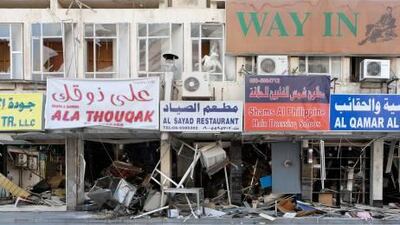SHARJAH // Residents ran from their flats after a gas explosion rocked the ground floor of a building on Al Wahda Road early yesterday, destroying 10 shops and damaging 15 parked cars.
Firefighters fought to extinguish a blaze at the scene shortly after the blast at 2.30am.
Sharjah Civil Defence helped residents to evacuate the Juma al Mutwawa building, which has 40 flats, and said later there were no injuries.
Rassul Khan, who lives in the building, said he ran to his children's bedroom to check his family was safe before they fled.
"There was chaos everywhere: building and car glass all over the place," he said. "It is hard to believe nobody died or was injured. As the neighbours came outside, we kept congratulating each other on having survived and wondering who would be the victims."
Police said it was fortunate the explosion occurred in the early hours of the morning when shops were closed and there was no traffic on Al Wahda Road.
"The blast is believed to have originated in Al Thouk Falafil and Shawarma Cafeteria," Mohammed al Saree, a senior official from Sharjah Civil Defence, said.
A Pierre Cardin clothing shop, Way Inn Supermarket and Al Sayyad restaurant were among the stores damaged.
Abdul Rashid, a watchman on duty at the time, said it was the loudest explosion he had heard. He said he ran out of his room, thinking it was a terrorist attack.
"The whole night, the building was out of bounds and we were busy co-operating with police for investigations, moving from one officer to another answering questions about the building, its residents and safety," he said.
Residents were allowed back into their homes at 1pm yesterday after the building was checked for structural damage.
Ramesh Nayl, who lives in the neighbouring ABC Building, said he felt the impact of the blast. "We thought it was in our flat and that there would be many casualties," he said.
Police yesterday said the explosion may have resulted from cafeteria employees' failure to turn off gas cylinders after use.
"Forensic laboratory experts have confirmed that the fire began from a leaking gas cylinder in the cafeteria," police said. "The leaked gas had filled much of the cafeteria, and when the explosion went off, it was a big one."
Police appealed to the public to carry out regular maintenance checks on gas cylinders and to ensure cylinderswere closed off after use.
The owner of the building, Abdullah Juma al Mutwawa, was not available for comment.
A police spokesman said the cost of damage and resulting losses from the explosion could "run into millions".
A committee of municipality, civil defence and police officials will investigate the accident and estimate total losses.Thefindings will be used by insurance companies to determine compensation, the spokesman said.

